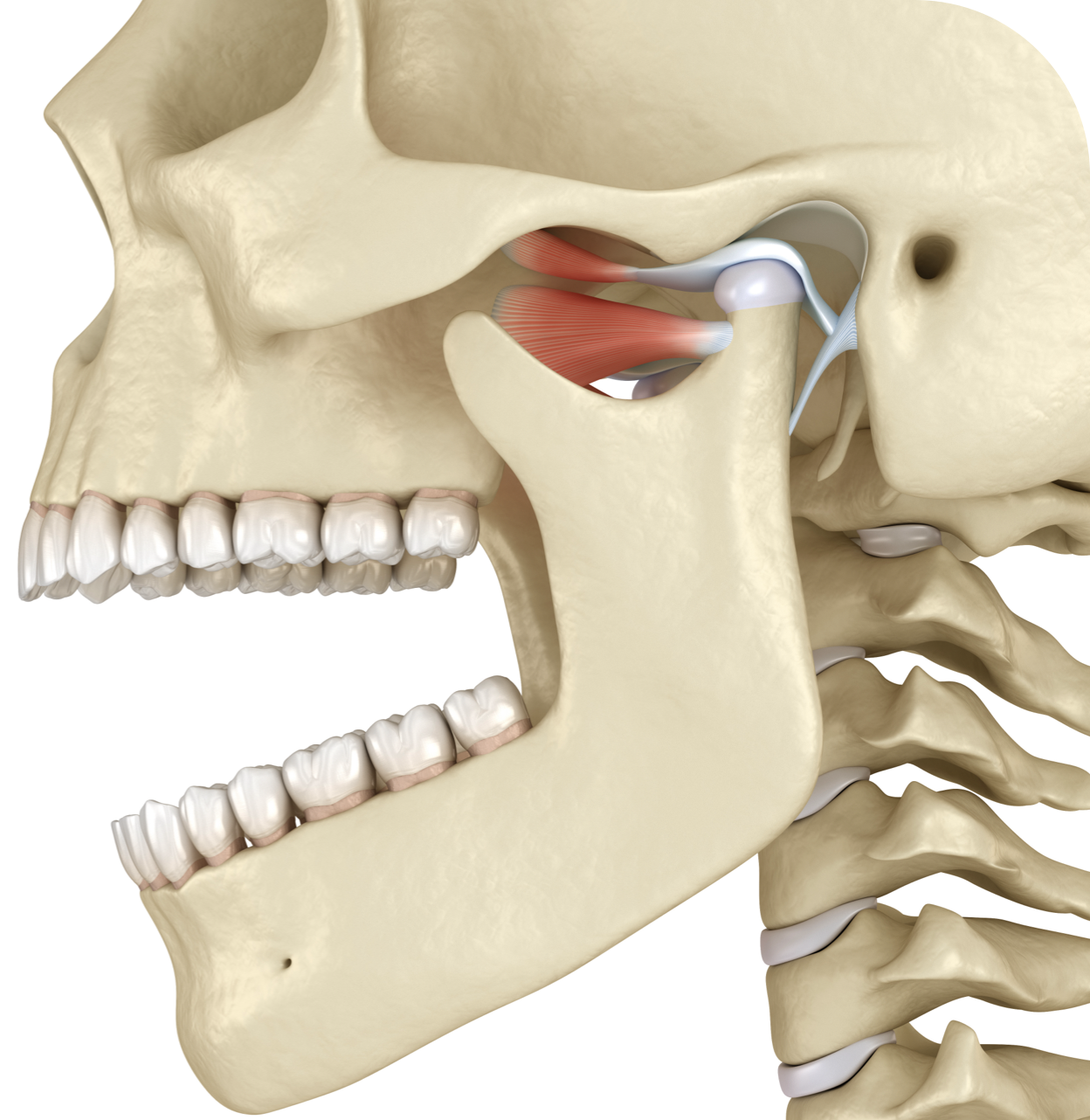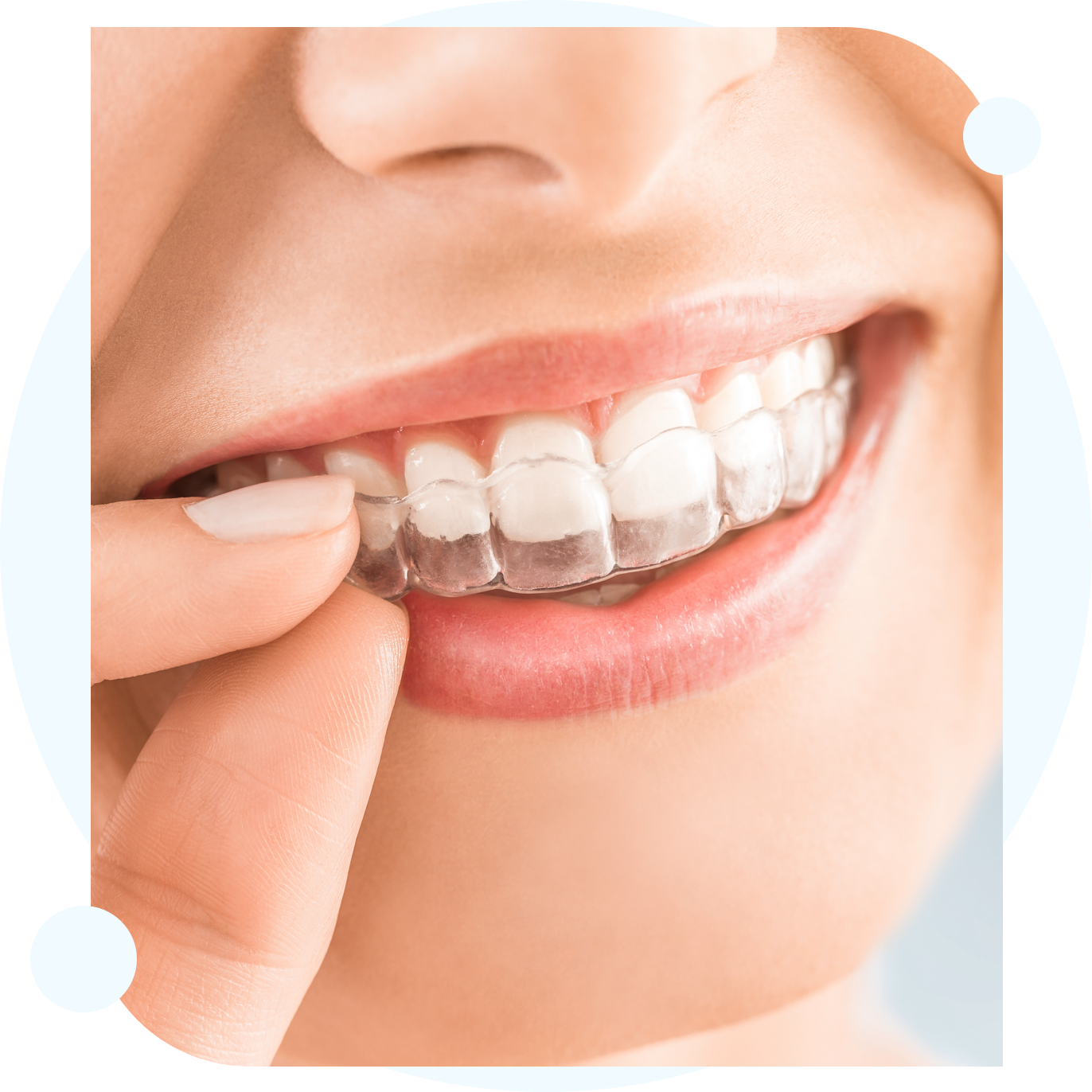Jaw Problems
(TMJ dysfunction)
TMJ, also known as Temporomandibular joint dysfunction, is a condition that limits the movement of the jaws.
What is TMJ dysfunction?
TMJ, also known as Temporomandibular joint dysfunction, is a condition that limits the movement of the jaws, it is misalignment of the teeth and the jaws which can lead people to clench their jaw and or grind the teeth. The Temporomandibular Joint should move smoothly in all directions, allowing us to eat, talk and yawn comfortably, If the temporomandibular joint becomes inflamed, it can commonly cause pain and discomfort.



Jaw Problems
What are the symptoms of TMJ dysfunction?
There are many symptoms of that can be associated with TMJ dysfunction, such as:
- Stiffness/locking of the Jaw
- Painful clicking, popping, or grating sounds in the joint
- Radiating pain in the face, neck, and shoulders
- Headaches, earaches, hearing problems
- Grinding and clenching of the teeth and jaw, also known as bruxism
- Tightness in the face and neck muscles
There is no scientific diagnosis for TMJ dysfunction, however with a full physical examination of the jaw and face, along with the description of the above symptoms, it can lead to the diagnosis of the disorder. A full physical examination can be carried out at the dental practice, involving feeling the jaw and chewing muscles for any discomfort and or tenderness, along with checking for limited jaw movements by asking the patient to open and close several times. It is very important to see a general Dental if you experience any of the symptoms.



Jaw Problems
What can I do to Treat
TMJ dysfunction?
There are several things one can do to treat TMJ dysfunction, there are things that can be done at home to help the pain and discomfort.
For example, there are many different jaw and face exercises that can be done during the day to ease the tension. The exercises involve jaw movements, opening the mouth partially and fully. An example of a good exercise if the “Goldfish Exercise”, Keeping your tongue on the roof of your mouth, place one finger on your TMJ and another finger on your chin. Drop your lower jaw completely and back. For a variation of this exercise, place one finger on each TMJ as you completely drop your lower jaw and back. Do this exercise six times to complete one set. You should complete one set six times daily. These exercises will help strengthen, relax, and stretch the jaw to help with the issues.
Other at-home remedies than can help are placing a warm compress on the tmj area to sooth the inflamed joint, stress relief techniques can help prevent jaw tension and mouth guards to prevent jaw clanging and teeth grinding.
To avoid TMJ pain progressing further, there are several small lifestyle changes that can help, such as:
- Limit large jaw movements (yawing and singing)
- Avoid Biting your lower lip
- Avoid Biting your nails
- Avoid Chewing gum
- Eat a soft diet to allow the TMJ to relax



Jaw Problems
What Antrim House Dental Practice can offer?
Our Dentists here at Antrim House can carry out a full physical examination of the jaw and face to help in any way they can. The option of a Mouth guard (Bite Guard/Soft Night Guard) is available here at the practice, with a very simple process of a single impression, sent off to the lab and returned in around 1 weeks’ time. A bite guard should be worn when sleeping to act as a barrier between the upper and lower teeth to stop them grinding together to relive tension.
In some cases, TMJ dysfunction symptoms may settled down alone in around 5-10 days, if the symptoms persist, it is best to get it checked out at the dentist, along with trying the at-home methods.
Contact Us
We have plenty on-site parking with designated spaces for blue badge holders. Feel free to contact us for more information on our services. We will be there to assist you in any way we can.
Contact
01902733369
01902861692
07958698880
07716197120
07498277004
antrimhousedental@aol.co.uk
Where To Find Us
88 Old Fallings Lane,
Wolverhampton, WV10 8BN
Opening Times
| Monday | 09:00 - 18:00 |
| Tuesday | 09:00 - 18:00 |
| Wednesday | 09:00 - 18:00 |
| Thursday | 09:00 - 18:00 |
| Friday | 09:00 - 16:00 |
| Weekend | CLOSED |
Jaw Problems
(TMJ dysfunction)
TMJ, also known as Temporomandibular joint dysfunction,
is a condition that limits the movement of the jaws.
What is TMJ dysfunction?
TMJ, also known as Temporomandibular joint dysfunction, is a condition that limits the movement of the jaws, it is misalignment of the teeth and the jaws which can lead people to clench their jaw and or grind the teeth. The Temporomandibular Joint should move smoothly in all directions, allowing us to eat, talk and yawn comfortably, If the temporomandibular joint becomes inflamed, it can commonly cause pain and discomfort.
Jaw Problems
What are the symptoms of
TMJ dysfunction?
There are many symptoms of that can be associated with TMJ dysfunction, such as:
- Stiffness/locking of the Jaw
- Painful clicking, popping, or grating sounds in the joint
- Radiating pain in the face, neck, and shoulders
- Headaches, earaches, hearing problems
- Grinding and clenching of the teeth and jaw, also known as bruxism
- Tightness in the face and neck muscles
There is no scientific diagnosis for TMJ dysfunction, however with a full physical examination of the jaw and face, along with the description of the above symptoms, it can lead to the diagnosis of the disorder. A full physical examination can be carried out at the dental practice, involving feeling the jaw and chewing muscles for any discomfort and or tenderness, along with checking for limited jaw movements by asking the patient to open and close several times. It is very important to see a general Dental if you experience any of the symptoms.






Jaw Problems
What can I do to Treat
TMJ dysfunction?
There are several things one can do to treat TMJ dysfunction, there are things that can be done at home to help the pain and discomfort.
For example, there are many different jaw and face exercises that can be done during the day to ease the tension. The exercises involve jaw movements, opening the mouth partially and fully. An example of a good exercise if the “Goldfish Exercise”, Keeping your tongue on the roof of your mouth, place one finger on your TMJ and another finger on your chin. Drop your lower jaw completely and back. For a variation of this exercise, place one finger on each TMJ as you completely drop your lower jaw and back. Do this exercise six times to complete one set. You should complete one set six times daily. These exercises will help strengthen, relax, and stretch the jaw to help with the issues.
Other at-home remedies than can help are placing a warm compress on the tmj area to sooth the inflamed joint, stress relief techniques can help prevent jaw tension and mouth guards to prevent jaw clanging and teeth grinding.
To avoid TMJ pain progressing further, there are several small lifestyle changes that can help, such as:
- Limit large jaw movements (yawing and singing)
- Avoid Biting your lower lip
- Avoid Biting your nails
- Avoid Chewing gum
- Eat a soft diet to allow the TMJ to relax
Jaw Problems
What Antrim House Dental Practice can offer?
Our Dentists here at Antrim House can carry out a full physical examination of the jaw and face to help in any way they can. The option of a Mouth guard (Bite Guard/Soft Night Guard) is available here at the practice, with a very simple process of a single impression, sent off to the lab and returned in around 1 weeks’ time. A bite guard should be worn when sleeping to act as a barrier between the upper and lower teeth to stop them grinding together to relive tension.
In some cases, TMJ dysfunction symptoms may settled down alone in around 5-10 days, if the symptoms persist, it is best to get it checked out at the dentist, along with trying the at-home methods.



Contact Us
We have plenty on-site parking with designated spaces for blue badge holders. Feel free to contact us for more information on our services. We will be there to assist you in any way we can.
Contact
01902733369
01902861692
07958698880
07716197120
07498277004
antrimhousedental@aol.co.uk
Where To Find Us
88 Old Fallings Lane,
Wolverhampton, WV10 8BN
Opening Times
| Monday | 09:00 - 18:00 |
| Tuesday | 09:00 - 18:00 |
| Wednesday | 09:00 - 18:00 |
| Thursday | 09:00 - 18:00 |
| Friday | 09:00 - 16:00 |
| Weekend | CLOSED |